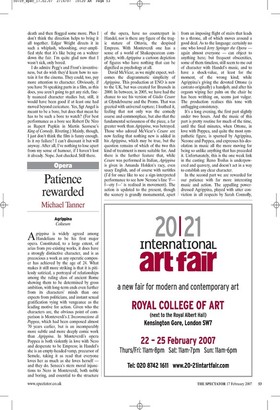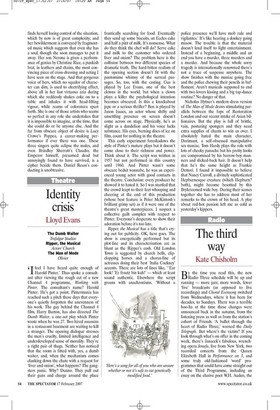Patience rewarded
Michael Tanner Agrippina Coliseum Agrippina is widely agreed among Handelians to be his first major opera. Constituted, to a large extent, of arias from pre-existing works, it does have a strongly distinctive character, and is as precocious a work as any operatic composer has achieved by the age of 24. What makes it still more striking is that it is pitilessly satirical, a portrayal of relationships among the ruling class of ancient Rome showing them to be determined by gross ambition, with long-term ends even further from its characters' minds than one expects from politicians, and instant sexual gratification vying with vengeance as the leading motive for action. Given who the characters are, the obvious point of comparison is Monteverdi's L'Incoronazione di Poppea, which had been composed almost 70 years earlier, but is an incomparably more subtle and more deeply comic work than Agrippina. In Monteverdi's opera Poppea is both violently in love with Nero and desperate to be Empress; in Handel's she is an empty-headed vamp, precursor of Semele, taking it as read that everyone loves her as much as she loves herself — and they do. Seneca's stern moral injunctions to Nero in Monteverdi, both noble and boring, and essential to the structure www.spectator.co.uk of the opera, have no counterpart in Handel, nor is there any figure of the tragic stature of Ottavia, the despised Empress. With Monteverdi one has a sense of a world of Shakespearean complexity, with Agrippina a cartoon depiction of figures who have nothing that can be dignified as psychology at all.
David McVicar, as we might expect, welcomes the diagrammatic simplicity of Agrippina. This production at ENO is new to the UK, but was created for Brussels in 2000. In between, in 2005, we have had the chance to see his version of Giulio Cesare at Glyndebourne and the Proms. That was greeted with universal rapture; I loathed it, feeling that not only was the comedy coarse and commonplace, but also that the fundamental seriousness of the piece, a far greater work than Agrippina, was betrayed. Those who adored McVicar's Cesare are now feeling that nothing new is added in his Agrippina, which may be true, but the question remains of which of the two this kind of treatment is more suitable for. And there is the further feature that, while Cesare was performed in Italian, Agrippina is given in Amanda Holden's racy, even saucy English, and of course with surtitles (I'd for once like to see a sign-interpreted performance to see how Nerone's line Tf—ety f—' is realised in movement). The action is updated to the present, though the scenery is grandly monumental, apart from an imposing flight of stairs that leads to a throne, all of which moves around a good deal. As to the language: certainly no one who loved Jerry Springer the Opera — again almost everyone — can object to anything here; but frequent obscenities, some of them timeless, still seem to me out of character with Handel's music, and to have a shock-value, at least for the moment, of the wrong kind; while Agrippina's giving the devoted Ottone (a castrato originally) a handjob, and after his orgasm wiping her palm on the chair he has been writhing on, seems just vulgar. The production realises this tone with unflagging consistency.
It's a long evening, the first part slightly under two hours. And the music of this part is pretty routine for much of the time, until the final minutes, when Ottone, in love with Poppea, and quite the most sympathetic figure, is spurned by Agrippina, Nerone and Poppea, and expresses his desolation in music all the more moving for being so unlike anything that has preceded it. Unfortunately, this is the one weak link in the casting: Reno Troilus is underpowered and quavery, and doesn't act in a way to establish any clear character.
In the second part we are rewarded for our patience with far more interesting music and action. The appalling powerdressed Agrippina, played with utter conviction in all respects by Sarah Connolly, finds herself losing control of the situation, which by now is of great complexity; and her bewilderment is conveyed by fragmented music which suggests that even she has a soul, though she soon manages to put it away. Her son Nerone is given a performance of genius by Christine Rice, a punkish brat, in leathers and chains, the most convincing piece of cross-dressing and acting I have seen on the stage. And that gorgeous voice of hers, which no squalor of character can dim, is used to electrifying effect, above all in her last virtuoso aria during which she recklessly shakes coke on to a table and inhales it with head-lifting vigour, while reams of coloratura spurt forth. She is one of those artists who seems so perfect in any role she undertakes that it is impossible to imagine, at the time, that she could do or be anyone else. And the far from obscure object of desire is Lucy Crowe's Poppea, a career-making performance if ever there was one. These three singers quite eclipse the males, and even Brindley Sherratt's Claudio, the Emperor himself, presumed dead but annoyingly found to have survived, is a cipher beside them. Daniel Reuss's conducting is unobtrusive.


























































 Previous page
Previous page